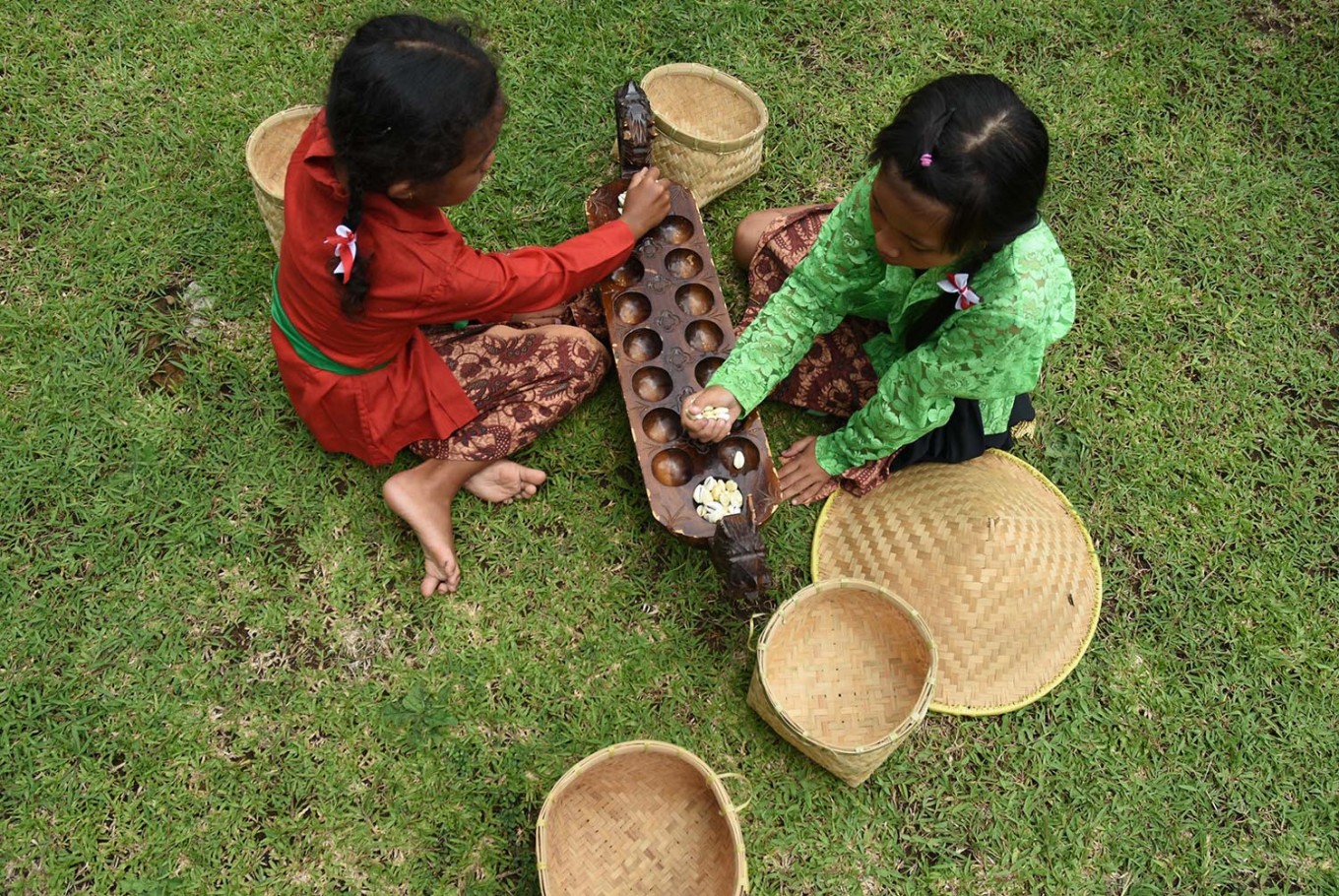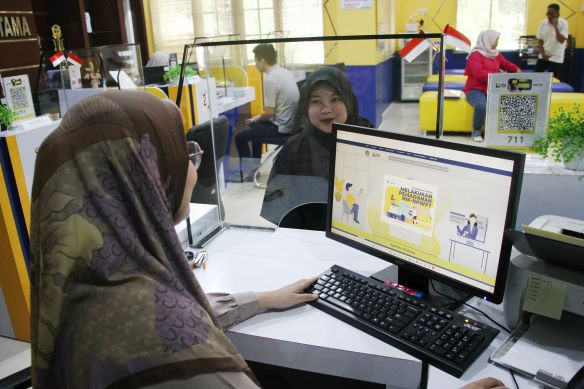Uphill battle against child marriage
Child marriage is as complex as a spider web and has been haunting the lives and futures of Indonesia’s 85 million children.
Change Size
 Ready, set, count: Two girls play dakon, a traditional game, during the Ajar Pusaka Budaya event. (JP/Aman Rochman)
Ready, set, count: Two girls play dakon, a traditional game, during the Ajar Pusaka Budaya event. (JP/Aman Rochman)
“If you like each other, the best thing to do is get married so you don’t commit a sin,” stated a married 16-year-old girl in Lamongan, East Java.
A married 17-year-old girl from the same city talked of her shattered dreams: “I thought when I got married, life would be more like I wanted it to be, but it isn’t ever going to be.”
In North Jakarta, a young mother of 15 said, “Of course we regret things, but we can’t change anything. The most important thing is that our kids don’t turn out like us.”
These are excerpts of consultations, jointly conducted by UNICEF and the Purposeful Productions movement focusing on adolescent girls. They aim to hear directly from girls, boys, women and men in Mamuju in West Sulawesi, North Jakarta, and Lamongan, East Java — three places with a high prevalence of child marriage — about why this practice continues and is so pervasive in Indonesia. The three girls are just a few of thousands of others trapped in early union.
Child marriage is common in almost all geographical pockets throughout Indonesia. Rates vary widely across the country and by level of government (province, regency and districts).
According to the 2012 National Socioeconomic Survey, West Sulawesi has the highest prevalence of child marriage at 37.3 percent, followed by Central Kalimantan and Central Sulawesi at 36.7 percent and 34.4 percent, respectively.
Child marriage is as complex as a spider web and has been haunting the lives and futures of Indonesia’s 85 million children. Ending this practice will be an uphill battle for Indonesia unless drastic changes in social behavior are made, with stronger political commitment and the strengthening of legal frameworks in children’s interests.
“This practice continues mostly on the grounds of cultural and religious norms,” said Women’s Empowerment and Child Protection Minister Yohana S. Yembise in an interview with The Jakarta Post in conjunction with National Children’s Day, which fell on July 23.
Many Islamic clerics say girls are ready for marriage once they start menstruating, as the Quran does not mention a specific age, while other experts cite verses that indicate that both bride and bridegroom should be mature enough and capable of judgment.
Cultural arguments include parents’ embarrassment when their teenage daughters have no suitors.
Despite modern developments, including more girls having a higher level of education, around one in nine girls marry before the age of 18, making Indonesia one of the top countries in absolute numbers of child brides and the child marriage burden — with about 375 girls marrying daily. Reasons to marry young go deep beyond mutual love, religious and traditional values and socioeconomic condition.
“Child marriage is a fundamental violation of girls’ rights. The practice is largely driven by poverty, a lack of access to education and social norms rooted in the lower status of women and girls here in Indonesia,” the minister said, adding that it also contradicted Indonesia’s efforts to achieve Sustainable Development Goals (SDGs) Goal 5, which includes eliminating all harmful practices of early and forced marriage by 2030.
Child marriage has attracted significant global attention in the last decade in response to growing evidence on the scale and scope of the problem, and is now specifically targeted in the SDGs. For Indonesia, being slow and ineffective in addressing this critical issue will lead to the country’s failure to achieve the SDGs in under 15 years.
Indonesia has ratified the United Nations Convention of the Rights of the Child through the 2002 Child Protection Law. However, inconsistencies and contradictions remain, as Yohana noted.
“Special considerations need to be taken seriously concerning the contradictions” in the Child Protection Law and Marriage Law, she said. The ministry is organizing a public discussion involving academics, policymakers, members of civil society, religious leaders, women and youth organizations on the issue.
While the 2002 Child Protection Law defines a child as someone below 18, the age of consent to marriage is 16 years for girls and 19 years for boys according to Article 7 of the Marriage Law.
The ministry, she said, has proposed revising the Marriage Law to end cases of child marriage but without success. Probably reflecting on what she said was a “controversial” issue, amendment of the 1974 law was listed in the 2015-2019 legislation program, but not included on the 2018 priority list.
Worse yet, the Marriage Law allows exceptions to the minimum age subject to consent from an appropriate authority, leaving occasion for children to marry legally at an even younger age.
A research report by 18+Coalition and UNICEF, Revealing the Truth of Marriage Dispensation: An Analysis of Child Marriage Practice in Tuban, Bogor and Mamuju Districts ( 2016 ), reveals that the procedure for granting marriage dispensation requests in Indonesia enables multiple interpretations and loopholes.
The report states the marriage dispensation “is fraught with challenges and […] is incompatible with national and international child rights frameworks”.
To end child marriage requires strong political commitment from the country’s top leader. Recently, President Joko “Jokowi” Widodo pledged to end child marriage amid mounting pressure.
Since child marriage in Indonesia remains a sensitive issue and is closely linked to religious and traditional norms, interfering with the Marriage Law could bear a political risk for President Jokowi or any other presidential candidates ahead of the 2019 presidential election. However, child marriage should not become a cheap bargaining chip for short-term political interests as it affects the lives of the country’s future generation.
While the focus on ending child marriage is on increasing the minimum age of marriage to 18 years, a broader set of corresponding laws and policies is needed to protect the rights of children and to prevent them from entering child marriage.
Every one of us must support young girls and boys to end this harmful practice so that all children have the right to choose when and whom to marry later in adulthood, and so they can complete their education to reach their utmost potential.
Parents, communities, traditional and religious leaders, the school system, the government, lawmakers and the media must work together in combating child marriage.
The government and lawmakers have the power to develop relevant legislation and policies, allocate available budget resources, monitor implementation and guarantee accountability.
To turn a blind eye to this problem is to endorse the damaging practice. Child marriage is not a child’s responsibility. It is our responsibility.
***
The author is writing a book on child and youth rights issues in Indonesia, including child brides.










